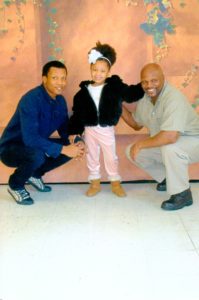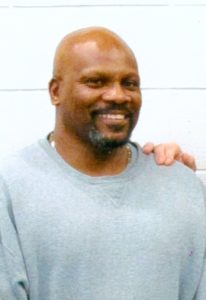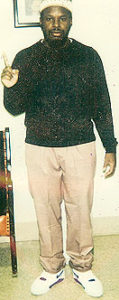
As Grandpa gets down to her level, smiling for the photo, he knows it may be the last time he sees her for a while. Not long after this photograph was taken, Robert Booker made the fifteen hour move west from Michigan, through Indiana, Illinois and Iowa – all the way to Yankton, South Dakota, where he settled into his new home on what was once a college campus, but is now known as Yankton Federal Prison Camp. We have so many prisoners, we really do turn schools into prisons.
Booker talks of how beautiful the place is, the skies filled with hundreds of geese travelling in one direction one day and in the opposite the next, searching for something. The trees hold nests too numerous to count. The food’s better than where he was before. The people are respectful.
To his friends, he’s Gino, or Bob, or Bobby. To some he is Robert. To the littlest ones, he is Grandpa. Regardless of who he is to them – he is currently far away. But, no matter where he has been geographically for the last two decades, he has been ‘removed’ from them all, cut off by concrete and fences, phone rules, mail restrictions and visitation room requirements.
Robert Booker has been without his family for nearly twenty-five years. He missed dinners, holidays, graduations and funerals. He missed watching his children grow and seeing his parents buried. Currently, he’s missing taking his grandkids to the park, telling them tall tales, and holding their tiny hands in his while they cross the street. He’s missing every single one of their ‘firsts’. He lost one generation and he is currently losing another.
Booker isn’t a danger to himself or anyone, that is why he is housed in a ‘camp’. He’s proven he is not a security threat and has spent the last two and a half decades writing. Not just writing, but achieving goals many writers only dream of. He’s worked hard, authoring six published books, with another fifty manuscripts in storage.
In spite of that, the federal government spends over $30,000 a year to keep him far removed from his family and housed in Yankton, South Dakota. That figure becomes three quarters of a million dollars if multiplied by twenty five, the approximate number of years that Booker has been incarcerated. That’s a lot of money to keep a man that is no threat to anyone from going home.
The housing costs do not include the money the government has spent to fight the legal battle to keep him behind bars. Mr. Booker was arrested June 29, 1994 on charges that included possession with intent to distribute crack cocaine, conspiracy to possess with intent to distribute crack cocaine and operating a ‘crack distribution house’.
On April 13, 1995, Booker was sentenced to twenty years in federal prison. That wasn’t enough, and in July of 1996 he was sentenced again and given thirty years. A year later – Booker was again resentenced, this time getting Life. It’s hard to understand why so much money would be invested to keep one nonviolent individual from ever being free again, and it would be difficult to calculate how many thousands of dollars were spent in order for the prosecution to achieve that goal. It seems the man hours and funds could be spent on something much less destructive and more productive. It defies logic, really.
Today, nearly twenty five years after his conviction, Robert Booker is a loving father, an adoring grandfather, an author, and friend to many. There was a war started decades ago that has not improved the drug situation in this country, but rather continues to feed the hunger of the largest mass incarceration problem in the world – the overpopulation of the prisons in the United States. This destructive pattern is not only filling our prisons to overflowing, but also destroying families, leaving large sections of society feeling hopeless, helpless and targeted – with good reason.
Twenty years into Booker’s life sentence, the sentencing guidelines changed, reducing Life to 38 years. Then, before he left office, Obama granted him clemency, once again reducing the sentence, this time to thirty years.
 Yet, Robert Booker remains in prison to this day. He is serving his time as a trusted inmate, walking the halls of what used to be a college campus in Yankton and watching the geese fly by. He continues to miss all of the ‘firsts’ with his grandkids, walking in endless circles around a track, and writing. And the government continues to fund his incarceration in order to punish a man who has already been punished, reform a man who has already been reformed, and keep a man they know is not a threat to anyone far removed from those who love him. For what? Robert Booker is the face of the fallout of the failed war on drugs.
Yet, Robert Booker remains in prison to this day. He is serving his time as a trusted inmate, walking the halls of what used to be a college campus in Yankton and watching the geese fly by. He continues to miss all of the ‘firsts’ with his grandkids, walking in endless circles around a track, and writing. And the government continues to fund his incarceration in order to punish a man who has already been punished, reform a man who has already been reformed, and keep a man they know is not a threat to anyone far removed from those who love him. For what? Robert Booker is the face of the fallout of the failed war on drugs.
AUTHOR’S NOTE. Robert Booker loves to hear from people and readers of his books. He can be contacted at:
Robert Booker #19040039
Federal Prison Camp Yankton
P.O. Box 700
Yankton, SD 57078
Booker’s books can be purchased at his Author Page on Amazon.
![]()
 “I just want to watch my grandkids grow up,” Andre Williams recently told a friend. It’s not a lot to want, but for Andre it might be impossible. Just as impossible as it was to watch his own kids grow up. Williams is just over halfway through a forty year prison sentence. It’s not hard to understand how he got to prison, what’s hard to understand is why they won’t let him out.
“I just want to watch my grandkids grow up,” Andre Williams recently told a friend. It’s not a lot to want, but for Andre it might be impossible. Just as impossible as it was to watch his own kids grow up. Williams is just over halfway through a forty year prison sentence. It’s not hard to understand how he got to prison, what’s hard to understand is why they won’t let him out. They teach me that after twenty years in a cell – you are no longer the person you once were. Guilty or innocent or harshly punished – the people I know are no longer the people they were when they were incarcerated.
They teach me that after twenty years in a cell – you are no longer the person you once were. Guilty or innocent or harshly punished – the people I know are no longer the people they were when they were incarcerated. This week while I was driving my kids home from swim practice, a man lost his fight to live. He didn’t struggle during his execution, but he chanted, trying to make his voice heard and be a part of this place till his last breath.
This week while I was driving my kids home from swim practice, a man lost his fight to live. He didn’t struggle during his execution, but he chanted, trying to make his voice heard and be a part of this place till his last breath.
 I pray that this fury I feel over that comment doesn’t ruin me. As I sit here, I think of a friend of mine that shared a story with me. He’s in prison, and he’s going to be put to death some day for his crimes. I asked him about his earliest memories. He told me what they were. I promised not to share them without his permission, and I won’t. What I will say is that his earliest memories are what nightmares are made of. He was four years old. He was just a fragile, vulnerable little boy. Things happened to him that I can’t even think about without my heart breaking. Things happened to him that no little boy should ever, ever endure. He didn’t get help though. His life didn’t get better. He had no heroes. Not one. The world is at fault for what happened to that little boy and the consequences of how that formed his reactions to events in his life.
I pray that this fury I feel over that comment doesn’t ruin me. As I sit here, I think of a friend of mine that shared a story with me. He’s in prison, and he’s going to be put to death some day for his crimes. I asked him about his earliest memories. He told me what they were. I promised not to share them without his permission, and I won’t. What I will say is that his earliest memories are what nightmares are made of. He was four years old. He was just a fragile, vulnerable little boy. Things happened to him that I can’t even think about without my heart breaking. Things happened to him that no little boy should ever, ever endure. He didn’t get help though. His life didn’t get better. He had no heroes. Not one. The world is at fault for what happened to that little boy and the consequences of how that formed his reactions to events in his life. It happens. All lawyers aren’t motivated by what the public likes to believe they are – justice. There are a good number who are motivated by money. For others, their motivation may be career advancement. Some are motivated by fear of losing their position.
It happens. All lawyers aren’t motivated by what the public likes to believe they are – justice. There are a good number who are motivated by money. For others, their motivation may be career advancement. Some are motivated by fear of losing their position. Ralph has proclaimed his innocence from day one and has never wavered. He is a man sentenced to lose his life for three murders.
Ralph has proclaimed his innocence from day one and has never wavered. He is a man sentenced to lose his life for three murders. I didn’t want to think about ‘Death Row’ before that post. It was distant and removed from my reality, the least of my worries – until she described what it was like for her to accompany her friend on the day of his death and being separated by glass as she watched him lose his life surrounded by men doing their job – killing him. She made it real.
I didn’t want to think about ‘Death Row’ before that post. It was distant and removed from my reality, the least of my worries – until she described what it was like for her to accompany her friend on the day of his death and being separated by glass as she watched him lose his life surrounded by men doing their job – killing him. She made it real.